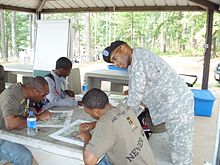
Back مفهوم الإرشاد Arabic Mentorluq Azerbaijani Mentoria Catalan Mentoring Czech Mentorskab Danish Mentoring German Mentoría Spanish Mentorlus Estonian هدایتگری Persian Mentorointi Finnish

Mentorship is the patronage, influence, guidance, or direction given by a mentor.[1] A mentor is someone who teaches or gives help and advice to a less experienced and often younger person.[2] In an organizational setting, a mentor influences the personal and professional growth of a mentee. Most traditional mentorships involve having senior employees mentor more junior employees, but mentors do not necessarily have to be more senior than the people they mentor. What matters is that mentors have experience that others can learn from.[3]
According to the Business Dictionary, a mentor is a senior or more experienced person who is assigned to function as an advisor, counsellor, or guide to a junior or trainee. The mentor is responsible for offering help and feedback to the person under their supervision. A mentor's role, according to this definition, is to use their experience to help a junior employee by supporting them in their work and career, providing comments on their work, and, most crucially, offering direction to mentees as they work through problems and circumstances at work.[4]
Interaction with an expert may also be necessary to gain proficiency with cultural tools.[5] Mentorship experience and relationship structure affect the "amount of psychosocial support, career guidance, role modeling and communication that occurs in the mentoring relationships in which the protégés and mentors engaged".[6]
The person receiving mentorship may be referred to as a protégé (male), a protégée (female), an apprentice, a learner or, in the 2000s, a mentee. Mentoring is a process that always involves communication and is relationship-based, but its precise definition is elusive,[7] with more than 50 definitions currently in use,[8] such as:
Mentoring is a process for the informal transmission of knowledge, social capital, and the psychosocial support perceived by the recipient as relevant to work, career, or professional development; mentoring entails informal communication, usually face-to-face and during a sustained period of time, between a person who is perceived to have greater relevant knowledge, wisdom, or experience (the mentor) and a person who is perceived to have less (the protégé).[9]
Mentoring in Europe has existed as early as Ancient Greek. The word's origin comes from Mentor, son of Alcimus in Homer's Odyssey.[10][11] Since the 1970s it has spread in the United States mainly in training contexts,[12] associated with important historical links to the movement advancing workplace equity for women and minorities[13] and has been described as "an innovation in American management".[14]
- ^ "Definition of MENTORSHIP". www.merriam-webster.com. Archived from the original on 2020-11-12. Retrieved 2021-03-13.
- ^ "Definition of MENTOR".
- ^ "Why Mentors Matter: A Summary of 30 Years of Research". SAP. Archived from the original on 2021-02-15. Retrieved 2021-03-13.
- ^ Shore, Ian Benjamin (2007). "The Impact of Mentorship: Why Organizations Should Grow Their Own Talent".
- ^ Rogoff, B (1990). Apprenticeship in thinking: Cognitive development in social context. New York: Oxford University Press. pp. 137–150.
- ^ Fagenson-Eland, Ellen A.; Marks, Michelle A.; Amendola, Karen L. (1997). "Perceptions of mentoring relationships". Journal of Vocational Behavior. 51 (1): 29–42. doi:10.1006/jvbe.1997.1592.
- ^ Dawson, Phillip (2014). "Beyond a Definition: Toward a Framework for Designing and Specifying Mentoring Models". Educational Researcher. 43 (3): 137–145. doi:10.3102/0013189X14528751. S2CID 59033921.
- ^ Crisp, G.; Cruz, I. (2009). "Mentoring college students: A critical review of the literature between 1990 and 2007". Research in Higher Education. 50 (6): 525–545. doi:10.1007/s11162-009-9130-2. S2CID 144726689.
- ^ Bozeman, B.; Feeney, M. K. (October 2007). "Toward a useful theory of mentoring: A conceptual analysis and critique". Administration & Society. 39 (6): 719–739. doi:10.1177/0095399707304119. S2CID 143989012.
- ^ Team, History Disclosure (May 4, 2016). "Word "Mentor" Originates from Homer". Archived from the original on June 20, 2019. Retrieved June 20, 2019.
- ^ "From Ancient Greece to the Corporate Workforce: the Meaning of Mentorship". February 4, 2014. Archived from the original on June 20, 2019. Retrieved June 20, 2019.
- ^ Parsloe, E.; Wray, M. J. (2000). Coaching and mentoring: practical methods to improve learning. Kogan Page. ISBN 978-0-7494-3118-1.
- ^ Laird, Pamela Walker (2006). Pull: Networking and Success since Benjamin Franklin. Cambridge: Harvard University Press. ISBN 9780674025530.
- ^ Odiorne, G. S. (1985). "Mentoring - An American Management Innovation". Personnel Administrator (30): 63–65.